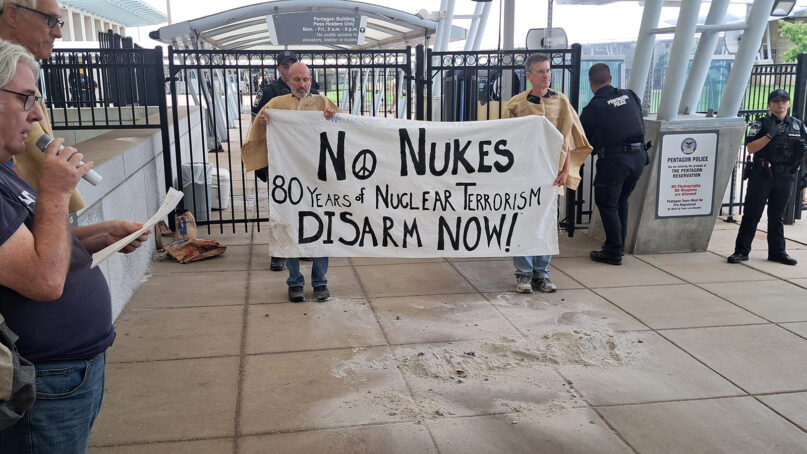WASHINGTON (RNS) — On the anniversaries of the U.S. atomic bombings of Hiroshima and Nagasaki 80 years ago, faith-based peace activists gathered at the Pentagon and the White House to call for nuclear disarmament and an end to war.
The rally, called a “nonviolent witness” by its organizers, brought together participants from across the country for prayer and song on Aug. 6 and 9, the dates in 1945 when American forces dropped the first and only nuclear weapons to be used in combat, first on Hiroshima and then on Nagasaki three days later. The bombs killed an estimated 210,000 people, including those who were poisoned by radiation.
On Saturday morning, the White House witness drew more than 50 people, one of the largest turnouts in recent memory, according to Art Laffin, who has helped organize the annual event since the 1990s.
“I was very heartened by the gathering and witness and everybody who participated,” said Laffin, a member of the Catholic Worker movement in Washington. “Everyone present was mindful of the terrible sin and crime that was committed and also inspired by the hope carried in the survivors’ message.”
No arrests were made at the White House, but at Wednesday’s prayer service demonstration at the Pentagon, two members of the Catholic Worker movement, Bill Frankel Streit and Steve Baggarly, were taken into custody by Pentagon Force Protection.
The two men, wearing sackcloth, poured ashes over a section of Pentagon grounds as part of their witness. In the protesters’ statement, read aloud by another participant just before the arrest, Streit and Baggarly wrote:

Bill Frankel Streit, left, and Steve Baggarly demonstrate against nuclear weapons at the Pentagon, Wednesday, Aug. 6, 2025, in Washington, on the 80th anniversary of the U.S. atomic bombing of Hiroshima, Japan. (Photo courtesy of Art Laffin)
“Today the United States can reverse course and begin to make amends by leading the world in a nuclear disarmament race, embracing the Treaty on the Prohibition of Nuclear Weapons and rallying the other nuclear armed states to do the same. Then human potential and national treasures can be redirected toward meeting critical human needs. The alternative is a world in ashes.”
The event was co-sponsored by the Dorothy Day Catholic Worker and nine other organizations, the Catholic peace organization Pax Christi USA and its Metro DC-Baltimore chapter, the Maryknoll Office for Global Concerns, Little Friends for Peace, the Isaiah Project, Assisi Community, Norfolk Catholic Worker and the Hampton Roads Campaign to Abolish Nuclear Weapons.
Separately, U.S. Catholic Church officials marked the anniversaries from Aug. 4 to 11 with a “Pilgrimage of Peace” to Hiroshima and Nagasaki. The delegation included faculty, staff and students from several U.S. Catholic universities, who were joined by Cardinal Blase J. Cupich of Chicago, Cardinal Robert W. McElroy of Washington, Archbishop Paul D. Etienne of Seattle and Archbishop John C. Wester of Santa Fe, along with Emilce Cuda, secretary of the Pontifical Commission for Latin America.
According to Vatican News, the pilgrimage reflects Pope Francis’ call to “remember, walk together, and protect,” with the goal of fostering prayer and dialogue that promote reconciliation, unity and peace in the Pacific region.
RELATED: Pope Francis condemns nuclear weapons as Putin threatens escalation in Ukraine
For more than 30 years, Laffin has brought photographs of Hiroshima and Nagasaki survivors and the destruction in Japan to the vigil, laying them out in front of the White House. Among them is a haunting dust silhouette in the shape of a human figure on a sidewalk, capturing the instant obliteration from a nuclear blast. Other photos spread before the White House depict the devastating physical toll the bombs inflicted on the people of Japan.
This year, the images were adorned with red and white roses. Laffin first obtained the photographs after meeting hibakusha, a delegation of atomic bomb survivors from Japan, in 1978 while attending a U.N. Special Session on Disarmament, an encounter that he said changed his life.
“I was so moved by their witness that I personally vowed that I would do whatever I could to work for nuclear abolition,” Laffin said.
A central act of the vigil at the White House was the reading of the “Apology Petition” to the people of Japan. First organized in 2016, the petition, which was co-sponsored by the international Pax Christi organization, expresses sorrow for the atomic bombings and pledges to work for nuclear abolition. That year, more than 700 U.S. citizens signed the petition before it was presented to a Hiroshima survivor in front of the White House at the exact time of the anniversary of the bombing of that city.
The petition effort was repeated for the 75th anniversary, gaining more than 240 signatures, and again this year for the 80th anniversary. In total this year’s petition has garnered more than 500 signatures and support from more than 60 organizations. It has been sent to the mayors of Hiroshima and Nagasaki and to Japan’s main survivors’ group, which recently received the Nobel Peace Prize.
Laffin said he has received acknowledgements from Nagasaki officials and the survivors’ group and is awaiting a response from Hiroshima regarding this year’s petition.
Following the arrests at the Pentagon, the protesters were processed at the Pentagon Police center, released and charged with “disobeying a lawful order” and “preservation of property.” Their court date is set for Oct. 16 in the U.S. District Court for the Eastern District of Virginia in Alexandria. The Pentagon Force Protection Agency has not yet responded to a request for comment.
“Policy isn’t going to change until hearts change,” Laffin said of this year’s anniversary events. “This is about calling for a radical conversion of heart, expressing our solidarity with the victims and people and with the survivors who continue to really inspire us to recommit ourselves to making sure that this evil is never repeated. In coming together, we encourage each other.”
Marie Dennis, 82, director of the Catholic Nonviolence Initiative, a project of Pax Christi International, attended multiple commemorative events marking the 80th anniversaries of the atomic bombings in Japan, including Saturday’s vigil.
RELATED: Atomic bombing of Hiroshima and Nagasaki left survivors wrestling with spiritual questions – here’s how Buddhists and Catholics responded
“The message, as clear as we can make it, is that the United States has an obligation to participate in the elimination of nuclear weapons,” Dennis said. “These weapons could never be used, and we must get rid of them.”
She said the group’s message, calling for the abolition of nuclear weapons, was explicit but not solitary.
“We are connected around the world with many others who, on the same date, have given witness to the urgent need to get rid of these weapons,” Dennis said.



